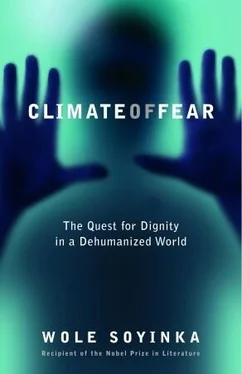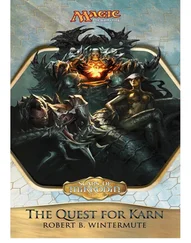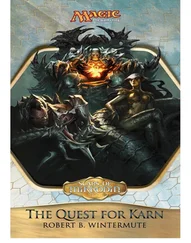Taking the foregoing together, we find that we need not wait to be visited or infiltrated by beings from outer space to arrive at the same state of fear and loathing that is associated with being manipulated by a force outside our own will. The vector of domination can, and constantly does, assail us in the here and present geographical environment. And we do know that in order to ensure absolute submission, that alien force must first lay a track of fear on which it rolls its juggernaut of domination. Even if the goals are not immediately articulated and may never be fully defined, power revels in first making itself manifest — then other social themes may follow in its wake. May. Or may not. Power is selfsufficient, a replete possession, and must be maintained by whatever agency is required. We have already indicated that the readiest methodology to hand is the inculcation of fear. Ethiopia under Mariam Mengistu and the Dergue, Pinochet in Chile, or Miloševićc in former Yugoslavia, or the terror regime of the late General Sanni Abacha of Nigeria, all provide chilling contemporary testimonies of this relationship. Robert Mugabe of Zimbabwe is doing his best to ensure that the African continent remains relevant in the global study of this social phenomenon.
The mutual dependency of power and freedom has long been recognized, its consummation undertaken throughout the history of human association to the accompaniment of orgies of human sacrifice. Whether we believe in that reproductive miracle or not, it is useful to seize the nature of power as we do that of Immaculate Conception, an autogenous phenomenon — though one that can also be a product of willed imitation — and then we come to recognize more and more that, for its full savoring, power need not burden itself with such banal undertakings as social responsibility or restraints of morality. Every day, atrocities of once unimaginable dimensions remind us of this fact, events that are traceable to that moment when one individual, already in a rarefied existence of his own, salivates over an exquisite moment of fulfillment as he watches his victims, mostly already existing in that half-life of social invalidation — the other half being mortgaged to the fear of the unexpected — squirm in awe of his efficacy of control. Surely it is not a merely fabulous projection that sees such an individual, alone in his or her hermetic world, suffused with an inward smile of satisfaction: “Now, you lot, I have you in my power. At this moment, I, and I alone, know, and am about to decide, your fate.”
I no longer recall the title of the film that was made of the Red Brigade in Italy, after the abduction and murder of a prime minister, Aldo Moro, who was out of power at the time. If we may leave aside the dubious politics of that assassination, and the movement of which these formed a part, what remains ineluctable is the study in smug self-righteousness of his abductors as they proceeded to decide the fate of their prisoner. Blame the director, if you wish, for failing to extract a sense of ideological necessity, inevitability, in the decision that was taken to eliminate him.What came through instead — perhaps it was the director’s intention anyway — was the sense of a “hallowed space” as the dominant environment of the revolutionary cell, an evocation of the unreal that was accentuated by the real psychological extract, the autonomy of power, conveyed in the demeanor of these mostly young individuals. This all-pervasive extract was, in my view, the exercise of power. These individuals, separated from a world that they genuinely despised, or affected to despise, were lodged in the hermetic enclosure of absolutism. A limited environment, yes, but an environment that they totally controlled, and of which they were the privileged janitors. This was what mattered most. They were not deciding the fate of an individual, not even of a symbol, I felt, but were simply engrossed in the exercise of secretive dominance, and this was what lent that film its bleak and pathetic intensity. One was transported into another world whose basic commodity, evenly shared within the circle of the Chosen and celebrated with all due ritual and solemnity, was simply — power. Unnamed, unacknowledged, power was nonetheless the palpable fetish of worship.
Well, theorizing apart, the young executioners, imbued with a sense of a “holy mission,” or simply wallowing — albeit with all appearance of deep reflection — in the pure ambience of power, left the Western, capitalist world in no doubt whatsoever about their essential product: a climate of fear that enveloped the moneyed, their relations, the remotely connected, the political class, the middle class, and, occasionally, innocent victims of what military language loves to gloss as “collateral damage.”
I must continue to insist that we do not underestimate the relevance of a material base — even justification — of the “holy mission” in all of this. However, even the most evidently objectivized base of the “holy mission” is often complicated by the sheer relish that is experienced in the control of others. It is not possible to reject absolutely the notion that one — just one in four, in ten, in two dozen — may be governed by no more than an impulse to secret, furtive dominance, the fulfillment of that individual by a moment of self-abandonment to this mysterious essence of power. I know, because I have met some such individuals. So, I am certain, have others in this audience. For now, I could do worse than attempt to burrow into the core of this commodity, one that has remained a puzzle to psychologists and philosophers — Hegel, Hobbes, Nietzsche, and all — and, as with all riddles of the human condition and social impulses, leaves one with more questions than answers. This is not a matter of obscurantist speculation. Rather, there is an almost obsessive quest for some clarifying clues when one has been a participant in the kind of deadly struggle that ensues when one individual, a single mortal with no discernible exceptional qualities, convinces himself that it is his mission to bludgeon a populace of some millions — ten, twenty, forty, a hundred or more millions — into submission.
So now, directly to that conundrum — power — just what is that? We know what it does. For a start, power takes away the freedom of the other and replaces it with fear. Still, that does not answer the ontological question. What, we may ask, is the common factor, the ingredient that guarantees a trill of nervous apprehension in, on the one hand, an audience watching Dr. Strangelove and, on the other, the citizens of Maryland with a sniper on the loose? Power, of course. The primitive fear of being controlled. It does not matter whether it is an invasion from outer space or power wielded from a subterranean command post: some alien force is about to take control of us, to dominate — and, if necessary in the process, to terminate our existence. We never stop to think — or, at best, a secondary consideration is whether such a force might be for the good, that humanity might indeed be improved by such a takeover. Volition, to which we desperately cling, is the very definition of our mature completion as social beings. The basis of rejection that registers itself in an audience seated at a theatrical or cinematic representation of the megalomaniac has always been the antithesis of human volition — power!
We have known it also described as a sexual substitute or an aphrodisiac, but this only begs the question. Victims of rape often take a different position. Next to the horror of bodily violation, a frequent admission by victims is of the humiliation of being totally subjected to another’s control. And the more sadistic the rapist, the greater his urge to exact an acknowledgment from the victim of submission to his dominance. Sexual gratification is of course at the heart of such violations, but pre-eminent is the satisfaction of dominating another, making him or her totally subject to his whims, some of which may not even be sexual in nature. In whatever proportion we choose to present these cravings, there is no question that a sense of power generates its own satisfaction, and is an important element in the drive toward rape. So, once again, back to the question — just what is power?
Читать дальше












